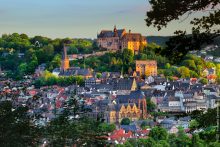
Germany has long been a popular destination for Eid travellers because of the variety of vacations the country has to offer: From city breaks to naturistic explorations, adventure holidays to sporting experiences. Now this year, with restrictions having eased, the country is gearing up for an influx of visitors once more – including a considerable number from the Gulf region.
While Germany has countless attractions, some of the key inspirations for Eid travel include the town of Marburg, which is celebrating its 800th anniversary this spring, so culture vultures have the chance to revel in a tour that spans eight centuries of history and includes important figures such as Saint Elisabeth, Landgrave Philipp, and Emil von Behring. Other events the town has encountered over the years are also highlighted.
With the weather warming up, outdoor activities in Germany are also set to enjoy popularity, like the Romantic Road in Möttingen. With a minimum of three-day itineraries encouraged to revel in all the beauty of the 350km route through forests, mountains and villages seeped in half a century of history, the trip is perfect for those looking to soak up both nature and culture.
With many mosques throughout Germany open to tourist visits throughout the year, the Blue Mosque in Hamburg is one of the oldest Islamic sites in the country. Renowned for its exceptional structural design, its beautiful shades of turquoise blue accompanied by Arabic calligraphy wrap around several prayer rooms, which together can hold up to 1,500 people. The mosque also features one of the world’s largest carpets – it took three years to complete and required 22 people hand-tying 80 million knots.
“Germany’s longstanding ties with various international communities have seen a number of cultural and historical sites emerge, with many of these key sites of keen interest for GCC travellers,” said Yamina Sofo, Director Sales & Marketing at the German Tourism National Office. “The country’s inclusive spirit has fostered an increase in cultural dining hotspots across Germany, with our world-class halal restaurants and cafes growing increasingly popular with locals and visitors alike.”
Berlin’s Sonnenallee, also known as ‘Arab Street’, has become a popular destination for halal and Levantine cuisine. The street features a plethora of diverse cafes, bakeries and Arab stores with specialist stores selling international items such as snacks and garments from Muslim countries. With Germany ranked as the world’s third-largest exporter of food and drink products, ‘Arab Street’ embodies Germany’s diverse F&B product options. While the popular walkway dominates the halal food scene in Berlin, there are a multitude of options for everyone to enjoy scattered around both the city and the country.
In areas of the capital such as Tiergarten, Friedrichshain-Kreuzberg, and Neukölln, travellers can experience a variety of eateries across the country. From Turkish delights in Hamburg and Syrian delicacies in Frankfurt, to halal supermarkets in almost every state, there is a wealth of options available wherever travellers decide to visit.
And for music lover, the Thuringia Bach Festival represents the biggest music festival in the state. Running until May 5, Johann Sebastian Bach’s renowned music is being celebrated with 47 concerts across the state from acclaimed musicians.
 Tourism Breaking News
Tourism Breaking News


